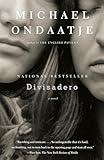As I watch a crowd build for readings at the public library, it is always with some anxiety that I survey my strange companions – chess geeks there for Gary Kasparov, decomposing leftists to hear Lawrence Wright on Iraq – and worry about my place among them.
 Last Thursday, when Michael Ondaatje came to the Philadelphia public library to read from Divisadero, there was no such trepidation however. It may set me on edge to share politics with a room of people, but it is intimate to share a story. While we waited for Ondaatje to appear, a library staffer poured water into a glass beside the lectern and I chatted with the woman sitting next to me. Neither of us had read Divisadero, but we had The English Patient between us. She had finished it well after midnight, in bed on a Tuesday. I was on a train headed for Albany, pulling along the Hudson, when I put my copy down.
Last Thursday, when Michael Ondaatje came to the Philadelphia public library to read from Divisadero, there was no such trepidation however. It may set me on edge to share politics with a room of people, but it is intimate to share a story. While we waited for Ondaatje to appear, a library staffer poured water into a glass beside the lectern and I chatted with the woman sitting next to me. Neither of us had read Divisadero, but we had The English Patient between us. She had finished it well after midnight, in bed on a Tuesday. I was on a train headed for Albany, pulling along the Hudson, when I put my copy down.
Ondaatje took the stage in standard touring author attire, a loosely cut gray suit over a white dress shirt, open at the collar. He had a puff of thinning white hair and a beard to match and a round of middle age paunch drooping over his waist. Never having met the man, I could have picked him out of a room of strangers.
Ondaatje explained that he began his writing career as a poet and that tonight, before he began Divisadero, he wanted to read a few stanzas. I could not tell if this was routine, or if he’d been grabbed by an impulse on the way over. Either way, the room was rapt as he read “The Cinnamon Peelers Wife” which contained the question, “what good is it to be the lime burner’s daughter/ left with no trace/ as if not spoken to in the act of love/ as if wounded without the pleasure of a scar.” There was ample nodding as he went along, and some affirmational sighing at the end. It was reassuring to feel that out of this monotonous book tour, there might be some live pleasure in tonight’s performance. That, I think, was at least half the enjoyment of the poems, both our own, and what we hoped he gained by reading them.
Book readings, particularly of literary fiction, often have an awkward quality. Athletes and actresses practice their craft in public and we consume it in the company of other people, but books are private affairs from start to finish. Ondaatje read a considerable amount from Divisadero, which is written in three parts and plays with time and memory much like The English Patient does. His prose has the same impressionistic, scattered quality as his poetry and subsequently Ondaatje talked about learning to write as if creating a collage. He was affable and warm and seemed genuinely happy to be in a basement auditorium with a room of people who had filled the interstices of their lives with his work.
When it came time for questions, a man of approximately Ondaatje’s same age alluded to Henry James and Evelyn Waugh and asked Ondaatje to comment on the miscegenating effects of his work. Ondaatje answered he was glad if his writing had that effect, but that it was not really on his mind when he wrote. I raised my hand next. I wanted to know why he thought it was that it takes time before tragedies and wars yield themselves to art, such that the first efforts are rarely as good as later ones. He answered that he was not really interested in writing about political themes, and preferred to take the perspective of small characters with peripheral relationship to big events. I don’t think he meant to elide the question. It was more that from the perspective of his own creative experience, my question did not make any sense. As more questions followed, Ondaatje seemed a little befuddled by the inquiries and connections people drew from his work. They were clearly not the same provocations which had spurred him. It is possible for two people to love the same thing for different reasons and that was the space which developed between Ondaatje and the crowd as the event neared its finish. He had the pleasure of writing his stories, and we had the pleasure of reading them, and the limit of that relationship was like the pleasure of a scar.








